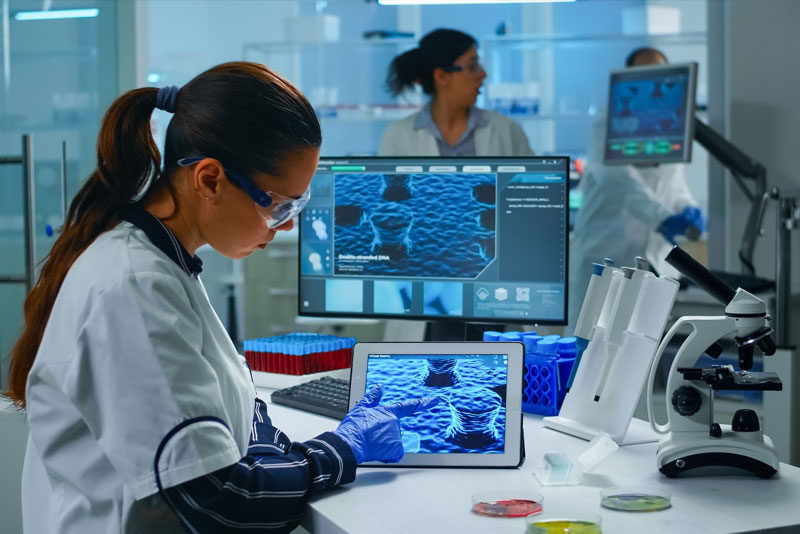Scientists are the adopters of the latest technologies, but even today there are several laboratories that still rely on paper-based data. They deal with critical data related to drug development and testing processes, and having accurate data is vital. Laboratories can keep vital paper-based data safe by scanning lab documents with the help of a document scanning company. This ensures productivity, better security, transparency and sustainability in labs. Scanning of documents into digital files improves efficiency and workflow too. It also helps in reduction of physical space requirement, and much quicker document search and retrieval of data.
According to Gartner,” a digitalized lab is one that is using digital technologies to change the way they operate their lab, optimize their business model, and ultimately provide new revenue and value-producing opportunities”. Scanning of lab records refers to the process of moving away from paper-based work records and data. Digitizing of lab records ensures that the records are accurate. This also ensures data integrity in quality assurance and quality control laboratories. The digitized data can be used for big data analysis, stored in the cloud, and also used for automation.
Researchers and scientists digitize their old lab notebooks for many reasons. Digital records can be backed up, and also be encrypted to protect them from theft. Digital lab records need no physical space, and these can be stored in the cloud or at a central repository to be used by multiple team members at the same time from different locations. The scanning of lab records makes them readable and accessible; they can also be archived. If the scanning vendor or software has optical character recognition (OCR), scanned typewritten text can also generally be searched.
However, OCR is not error-free, so the resulting text may need manual correction.
Scanning Using Smartphones
When the pandemic broke out, plant pathologist Linda Kinkel’s laboratory team at the University of Minnesota in St Paul, looked for tasks they could do from home. This is when they thought of digitizing their records. They converted a 30-year-old collection of paper lab notebooks into digital format. The collection includes dozens of bound, standard-sized lab notebooks with yellow paper and red covers, and each team member took a few home when the lab closed at the start of the pandemic restrictions. Scanning each page with a smartphone isn’t fast, but because every lab member has one, it is efficient: there’s never a queue to access a physical device.
Use of Smart Technology
With digitized data, ordinary labs can be converted into automated ones with smart technology and analytics that can offer better instrumentation and services to their customers without compromising the quality of results, cost-effectiveness, or laboratory space. It also provides flexibility and interconnectivity between assays and other procedures. A digitized lab can become more advanced when it has access to more data. In laboratories, data is transformed into science and with each experiment or research the amount of data keeps increasing. The digitized data can be converted into useful information only with a digitally connected lab. A digital lab, which is a paperless working environment, helps to incorporate all the important instrumentation for complete data analysis, and allows to make efficient decisions.
Using Artificial Intelligence
The main purpose of using artificial intelligence (AI) in a laboratory is to monitor operations and provide more advanced insights essential for scientific productivity. AI, along with universal sensing capabilities helps detect and monitor a range of variables and it enables to understand operational and financial benefits. With quality data and insights, AI can ensure monitoring of all equipment usage in the lab and holistic capacity tracking.
Stay Competitive with Digitization
Scientific innovation is rising globally, therefore it is time for labs to consider investing in advanced technology to become digitally enabled and stay abreast with the competitive world. At present we have a data-driven environment, therefore scientific laboratories must fundamentally convert their data for its effective use. To keep up with the dynamic world and gain a competitive edge in a world of constant change, a continual transformation of lab operations and scientific data management is essential. This will be the first and most important step toward becoming a truly digitalized lab.
Scanning lab notes involves putting the books under a specialized book scanner, and imaging every page separately. It is labor-intensive and one should also know how to use the technology. With digitization of documents, your work is not only secure but also protected from theft, damage and misplacement or loss of data. A reliable document scanning company can help in proper conversion of data without any loss of data and damage. They have employees who are trained to handle documents carefully and efficiently; they also ensure quick completion of the project.




